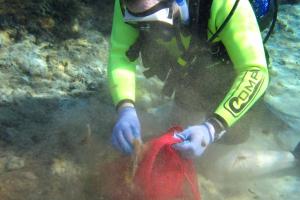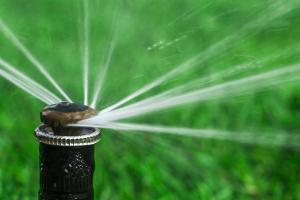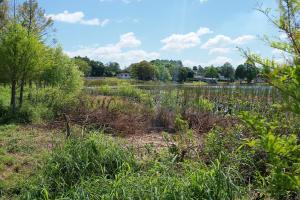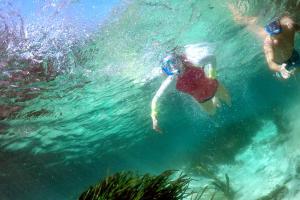Search Content
Displaying results 41 - 60 of 4110
You can save water, time and money by taking steps now to make your yard Florida-friendly.
A properly maintained Florida-friendly yard can help homeowners conserve water and reduce pollution of water resources. A Florida-friendly yard can be beautiful and an asset to the environment, conserving water, protecting natural resources and preserving Florida’s unique beauty.
January
The University of Florida’s Institute of Food and Agricultural Sciences Extension…
Over time, the springs’ water quality and amount of water they discharge have been threatened by both human activities and natural factors. The challenges facing our springs include:
- Increases in nutrients like nitrogen and phosphorus due to development in springsheds, excessive fertilizer use and failing septic tanks. Excess nitrate levels in water can be harmful to aquatic insects, amphibians and fish. If algae have an…
Water plays an important role in our lives. Because we live in a state surrounded by so much water, we often forget about the importance of conservation.
All of us can become better at saving water. Have your class pledge to save at least 10 gallons of water per day by using the pledge to the right and we will send you a free conservation challenge kit!
Each kit includes a class set of:
- Water Conservation pledge cards
- "Save Water We Do!"…
During cooler months in fall and winter, your lawn doesn’t need watering every week. It’s the best time to train your yard to need less water! So only water your lawn every other week and only if it needs it. Too much irrigation…
- Makes your lawn less able to survive droughts
- Encourages pests and disease
- Wastes water
- Grass doesn’t need as much water in the cooler months
- Apply 1/2" to 3/4" of water …
What is a Conservation Easement? A conservation easement is a legal agreement that permanently restricts the use of a portion or the entirety of a property, often as a condition of an Environmental Resource Permit (ERP). Conservation easements are recorded in the public records of the county in which the property is located. In many residential developments, conservation easements are placed over natural areas as a part of the permitting process for stormwater…
Benefits to builders and owners
- Saves an estimated $530 on utility bills annually, adding up to water savings of up to 48,291 gallons in one year per home
- Increases home values by approximately $10,000; per The Appraisal Journal, home values typically increase by $20 for every $1 reduction in annual utility bills
- Provides free marking support through customizable company brochures, plaques for homeowner display and free real estate staff training …
Rule 17.1(i)Disclosure of contracts for lobbyists who represent public entitiesThese individuals are full-time employees of the District and serve the public in a variety of ways. These include communicating and providing information about the District and its operations to members of the Florida House and Senate during the legislative process, and as such are registered lobbyists.
- Cara Martin, Government and Community Affairs Office Chief: $121,659.62
Residents have just a few weeks left to enter their water-wise yard in Tampa Bay Water’s annual Water-Wise Awards. If you live in Pasco, Pinellas or Hillsborough counties or the cities of New Port Richey, St. Petersburg or Tampa, you are eligible to enter the contest.
The Community Water-Wise Awards program recognizes individuals and businesses that are committed to conserving water resources and protecting the environment by using the best in attractive, Florida-…
What is a spring? A spring is a natural opening in the ground where water flows directly from the aquifer to the earth’s surface. The source of this fresh water is from seasonal rainfall that soaks into the ground, which is referred to as groundwater. Springs form when groundwater is under pressure and flows up through an opening called a spring vent, supplying flow to a river or other water body. A spring can occur individually or as a group of many springs. The most…
January 2025Q: Why should homeowners skip a week of irrigation in the winter?A: According to research by the University of Florida, grass only needs one-half to three-quarters of an inch of water every 10–14 days in the winter. That means you can skip a week of irrigation in the cooler months. In fact, if your lawn has received any significant rainfall, you can turn off your irrigation system and operate it manually as needed. It’s important…
Part of being a water superhero means fighting off the villains that threaten our water resources. That includes invasive plants that creep in and take over natural water habitats.
What Makes a Plant Invasive?
Invasive plants are non-native species that have been brought to Florida from around the world. Some non-native plants are harmless, but others can reproduce and spread rapidly, pushing out native plants and wildlife. When non-native plants…
OverviewApplicants will be asked to break this down in more detail in the application. Students will explore and understand the basics of water and how it moves above, on and beneath the Earth’s surface. As an introduction to the water cycle, students will make Water Cycle Wristbands and learn about the different processes…
Frequently Asked QuestionsWhat is Florida Water Starsm?Florida Water Star is a voluntary certification program designed to increase water efficiency inside the home and in landscapes and irrigation systems. While many certification programs provide general guidelines for water efficiency, Florida Water Star specifically addresses uses relevant to Florida. Following Florida Water Star criteria in new and existing buildings will help sustain the area’s…
OverviewApplicants will be asked to break this down in more detail in the application. Students will begin this grant project by developing a deeper understanding of the importance of clean, fresh water for humans and wildlife. Through in-classroom activities, students will learn about the source of our fresh water in west-central Florida and the importance of water conservation. This will include…
Hernando County residents interested in learning about how to create beautiful landscapes, conserve water and protect the environment can take advantage of a unique educational opportunity. A “Florida-Friendly Landscaping Grow Smart” workshop will be conducted in Hernando County at the SNPJ Lodge on March 2. The SNPJ Lodge is located at 13383 County Line Road in Brooksville.The half-day program, open to all Hernando County residents, starts at 8:30 a.m. The…
Learn about the District's founding and highlights of our 65 years in this interactive timeline of the District's history.- Requires a modern browser with javascript enabled
Your Questions AnsweredMarch 2019Q: What are stormwater ponds and why do we need them?A: A stormwater pond is designed to collect and manage runoff from rainwater. When rainwater lands on rooftops, parking lots, streets, driveways and other hard surfaces, the rainfall that doesn’t soak into the ground (stormwater runoff) flows into your neighborhood stormwater pond through grates, pipes, shallow swales or ditches.…
The Southwest Florida Water Management District’s Governing Board celebrated the success of the “Florida-Friendly Yards, Grow Smart” public awareness campaign Tuesday. The Tampa Chapter of the International Association of Business Communicators (IABC) recently presented the District with a Bronze Quill Award for the campaign. The Bronze Quill award recognizes excellence in business communications.Winners of the Bronze Quill Award are eligible for the…








